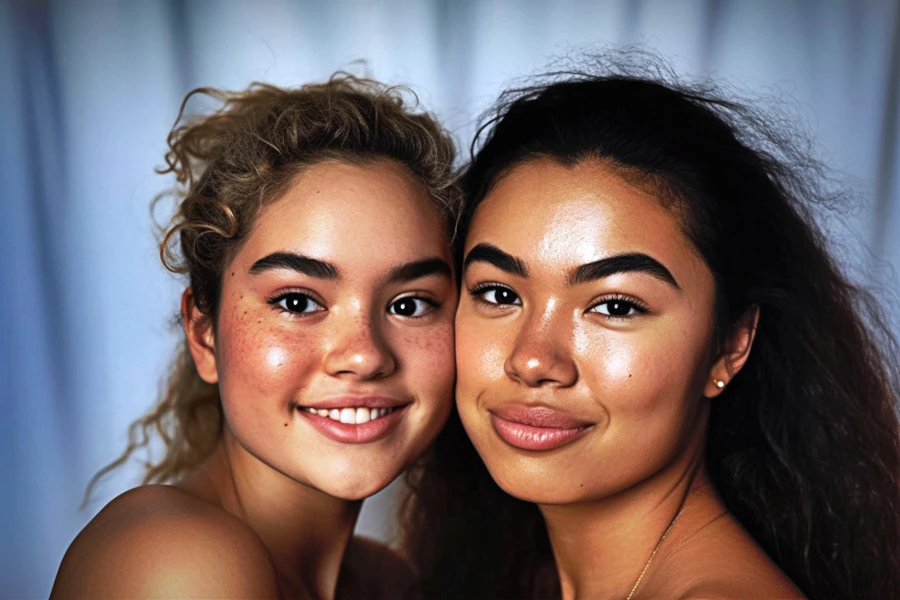Here at HGL, we’re passionate about skincare and want to help you find the perfect products and build a routine that works for you.
If you’re just getting started – or still trying to figure it out – the first step is to find your skin type so you can embark on your personalized journey.
If you want a more comprehensive look all the different skin types, check out Skin Types: Your Ultimate Blueprint for Radiant Skin.
Otherwise, here are the main sections in this guide if you want to jump ahead:
How to Find Your Skin Type
Figuring out how to find your skin type is an essential step towards creating a tailored skin care routine.

There are various methods to know what skin type you have, and next up, we’re going to guide you through 4 popular and effective techniques:
The Barefaced Test
The barefaced test is a simple and cost-effective way to find your skin type at home. Let’s have a look at how it works.
Step 1: Start by thoroughly washing your face and then patting it dry with a clean towel.
Step 2: Wait for an hour without applying any skincare products, allowing your skin’s natural state to reveal itself.
Step 3: After an hour has passed, examine the appearance of your skin and use your (clean) fingertips to check how it feels:
- If your skin feels tight and appears dry or flaky, you have dry skin.
- If it looks shiny and feels oily, you have oily skin.
- If you notice your skin is a combination of dry and oily, then this indicates combination skin
- Meanwhile, balanced and unproblematic skin signifies that you have a normal skin type.
Now that you’ve worked out which of the four main skin types you have, if your skin feels irritated or uncomfortable it might also be sensitive (sensitive skin can be normal, dry, oily, or combination skin).
The Blotting Sheet Test
Another method to find your skin type is the “blotting sheet test”.
To perform the blotting sheet test, gently press a clean blotting sheet onto different areas of your face, particularly the T-zone (forehead, nose, and chin).
If the blotting sheet picks up oil from all over your face, it indicates oily skin. If it only picks up oil from certain areas, you have combination skin. Otherwise, if you find little to no oil on the blotting sheet, that signals normal skin or dry skin.
Finally, if the test causes any discomfort or redness, consider the possibility that you may have sensitive skin.
Fitzpatrick Skin Type
The Fitzpatrick Skin Type is a classification system used to categorize human skin color and its response to sun exposure. The system divides skin into 6 skin phototypes, based on how much melanin is present in your skin – ranging from very fair (type I) to very dark (type VI).
Knowing your Fitzpatrick skin type can help you choose the right products and treatments for your skin. For example, if you find your skin type is more prone to hyperpigmentation or scarring, then you need to be cautious when using certain products or undergoing certain treatments.
Read more: Fitzpatrick Skin Type: Comprehensive Guide
Professional Consultation
While the DIY tests above provide practical ways to find your skin type, the most accurate assessment can be achieved through professional consultation with a dermatologist.
A dermatologist can thoroughly examine your skin, take into account any skin sensitivities or allergies, and recommend specific products and routines based on their expert opinion. They can also help you address an underlying skin condition or concern that might impact your skin type.
Feel Confident About Your Skin!
Now that you know how to find your skin type, you can embark on your personalized skincare journey with confidence, knowing the products and routines you choose will benefit and nourish your unique complexion.

With a good understanding of your unique skin type, you can now boldly select the right cleansers, moisturizers, and skin treatment options, such as exfoliation to remove dead skin cells, to address different skin types and concerns.
By understanding how to find your skin type and then incorporating the most suitable products, you’ll be able to maintain healthy skin, address skin concerns, and prevent issues such as sun damage, acne, and premature aging.
So, don’t wait any longer – find your skin type and start your personalized skincare journey today!
Frequently Asked Questions
Here are some of the most common questions people ask about finding out your skin type (and the answers, of course!) Click any of the links below to jump to any question:
- Which Skin Type is Best?
- Which Skin Type is the Most Difficult to Manage?
- Which Skin Type is the Rarest?
- Is There an App to Find Your Skin Type?
- Why Do I Have Acne But Not Oily Skin?
- How Do I Know if My Skin is Healthy?
- Can Your Skin Type Change Over Time?
- How Does Diet Affect Your Skin Type?
- Does the Weather Impact Your Skin Type?
- How Can I Keep My Skin Type Balanced?
- How Often Should I Assess My Skin Type?
- Can Men and Women Have Different Skin Types?
- How Does Age Influence Skin Type?
- How Do I Choose Products for My Skin Type?
Don’t forget that everyone’s skin is unique. Something that works for one person may not work for someone else. With this in mind, always consult with a dermatologist if you’re unsure about anything related to your skin.
Which Skin Type is Best?
Every skin type, be it oily, dry, combination, normal, or sensitive, has its unique attributes and challenges; therefore, it’s not accurate or helpful to classify one skin type as “best”. What’s essential is knowing how to find your skin type and treating it with care by using appropriate products and routines.
Which Skin Type is the Most Difficult to Manage?
The “difficulty” in managing a skin type is subjective and can depend on various factors like lifestyle, climate, and access to suitable skincare products. However, individuals often find combination and sensitive skin types challenging due to their fluctuating or reactive nature.
Which Skin Type is the Rarest?
It’s challenging to determine the “rarest” skin type since skin types can fluctuate based on factors like age, environment, and health. However, it’s generally believed that truly ‘normal’ skin – that is, skin that isn’t overly oily or dry and isn’t particularly sensitive – is less common.
Is There an App to Find Your Skin Type?
While there are apps that claim to analyze your skin, it’s always best to consult with a dermatologist or a licensed skincare professional to accurately determine your skin type. These professionals can also provide tailored advice on how to care for your unique skin.
Why Do I Have Acne But Not Oily Skin?
Acne isn’t exclusive to oily skin. Acne can also occur with dry, combination, and normal skin types. Factors like hormones, stress, certain medications, and the use of pore-clogging products can contribute to acne regardless of your skin type.
How Do I Know if My Skin is Healthy?
Healthy skin typically appears smooth, has an even tone, and is free of constant spots and inflammation. It’s also resilient, with a balance of moisture and oil, and it doesn’t react adversely to the products used regularly. If you have concerns about your skin health, it’s advisable to consult a dermatologist.
Can Your Skin Type Change Over Time?
Yes, your skin type can definitely change over time. Factors like age, hormonal fluctuations, diet, stress, and climate can all affect your skin’s behavior. For instance, younger people often have oilier skin, which can become drier as they age. It’s always a good idea to reassess your skin type periodically to make sure you’re using the best products for your current needs.
How Does Diet Affect Your Skin Type?
Diet plays a significant role in your overall skin health. Eating a balanced diet rich in vitamins, antioxidants, and omega-3 fatty acids can help nourish your skin from within, promoting a healthy complexion. However, a diet high in sugars, unhealthy fats, and processed foods may lead to increased oil production or exacerbate skin conditions.
Does the Weather Impact Your Skin Type?
Absolutely! Consider adapting your skincare routine to the current season and your environment because weather and climate can greatly impact your skin type. In particular, dry, cold winter air can make your skin feel parched, while hot, humid summer weather can cause your skin to produce more oil.
How Can I Keep My Skin Type Balanced?
Keeping your skin balanced involves a combination of a healthy lifestyle and a personalized skincare routine.
Regular cleansing, toning, moisturizing, and exfoliating can help maintain your skin’s natural balance. Moreover, drinking plenty of water, having a balanced diet, getting enough sleep, and reducing stress levels can also contribute to a healthier skin condition.
How Often Should I Assess My Skin Type?
Generally, it’s a good idea to reassess your skin type every few years, or when you notice a significant change in your skin’s behavior. This might be more frequent during times of hormonal change, like puberty, pregnancy, or menopause.
Can Men and Women Have Different Skin Types?
While the basic skin types apply to everyone, men and women can experience them differently. Men, for instance, tend to have thicker and oilier skin than women. However, anyone, regardless of gender, can have dry, oily, combination, or sensitive skin.
How Does Age Influence Skin Type?
As we age, our skin naturally changes. Mature skin becomes drier, less elastic, and more sensitive due to decreased oil and collagen production. These changes might mean that someone who once had oily skin could find their skin becomes more combination or dry as they age.
How Do I Choose Products for My Skin Type?
The first step in choosing skincare products is understanding your skin type. Once you know this, look for products formulated specifically for your skin’s needs.
It may take a bit of trial and error to find what works best for you, but the effort is worth it for healthy, glowing skin!